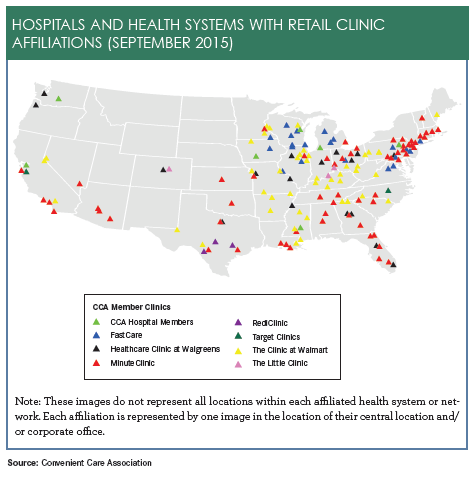Will More Retail Clinic Ownership Shift to Health Systems?
As more and more consumers seek care at retail clinics, health systems may want to follow in the footsteps of Advocate Health Care, which is taking ownership of 56 Walgreens Healthcare Clinics across the Chicago area in May.
As more and more consumers seek care at retail clinics, health systems may want to follow in the footsteps of Advocate Health Care, which is taking ownership of 56 Walgreens Healthcare Clinics across the Chicago area in May.

This isn’t the first time Walgreens has opted to outsource its retail clinic operations to a traditional health system. Last August, the drugstore chain announced a deal to open 25 new in-store retail clinics in Oregon and Washington State that will be owned and staffed by Providence Health & Services, the third-largest not-for-profit health system in the United States.
Historically, Walgreens and other retail pharmacy chains have staffed their clinics with their own employees, nurse practitioners, and physician assistants. The new health system-staffed model, however, seemingly allows drugstore chains to streamline their retail clinic operations and cut costs.
In addition to cutting costs, this approach helps establish and maintain a coordinated care continuum for patients and their providers, which is key as major health insurance plans such as United Healthcare and Aetna shift from the traditional fee-for-service model to value-based reimbursement under the Affordable Care Act (ACA).
Better coordination between retail clinics and health systems could also translate to more timely treatment and referrals for conditions such as gastroesophageal reflux disease (GERD) and other potentially problematic digestive health disorders—which is exactly what this issue ofContemporary Clinicis all about. The associated articles in this issue include “GERD in the Retail Clinic: When to Treat and When to Refer,” “Best Approaches to Acute Gastroenteritis,” “Counseling Pearls for IBS Patients,” and “PPIs and Antacids: How to Avoid Interactions.”
On a business note, don’t miss the article “How Retail Clinics Can Capture Newly Insured Patients,” which describes the retail health implications of health care coverage expansion through the ACA’s third open enrollment period that ended on January 31, 2016.
Thanks for reading!
Mike Hennessy
Chairman and CEO

Knock Out Aches and Pains From Cold
October 30th 2019The symptoms associated with colds, most commonly congestion, coughing, sneezing, and sore throats, are the body's response when a virus exerts its effects on the immune system. Cold symptoms peak at about 1 to 2 days and last 7 to 10 days but can last up to 3 weeks.
COPD: Should a Clinician Treat or Refer?
October 27th 2019The Global Initiative for Chronic Obstructive Lung Disease (GOLD) defines the condition as follows: “COPD is a common, preventable, and treatable disease that is characterized by persistent respiratory symptoms and airflow limitation that is due to airway and/or alveolar abnormalities usually caused by significant exposure to noxious particles or gases.â€
Diabetic Ketoacidosis Is Preventable With Proper Treatment
October 24th 2019Cancer, diabetes, and heart disease account for a large portion of the $3.3 trillion annual US health care expenditures. In fact, 90% of these expenditures are due to chronic conditions. About 23 million people in the United States have diabetes, 7 million have undiagnosed diabetes, and 83 million have prediabetes.
What Are the Latest Influenza Vaccine Recommendations?
October 21st 2019Clinicians should recommend routine yearly influenza vaccinations for everyone 6 months or older who has no contraindications for the 2019-2020 influenza season starting at the end of October, according to the Advisory Committee on Immunization Practices.
What Is the Best Way to Treat Pharyngitis?
October 18th 2019There are many different causes of throat discomfort, but patients commonly associate a sore throat with an infection and may think that they need antibiotics. This unfortunately leads to unnecessary antibiotic prescribing when clinicians do not apply evidence-based practice.
